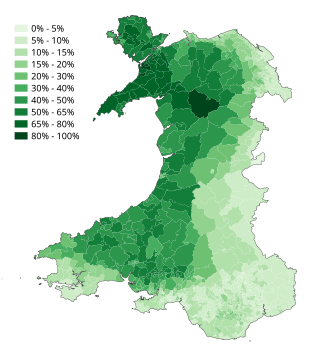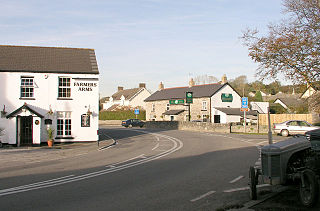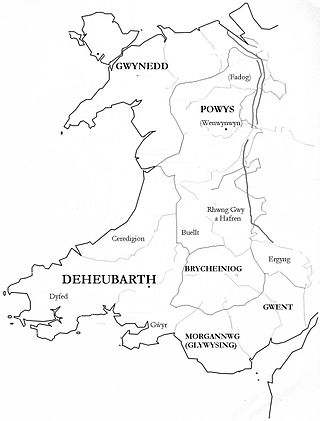Related Research Articles

Owain ap Gruffydd, commonly known as Owain Glyndŵr or Glyn Dŵr, was a Welsh leader, soldier and military commander in the Late Middle Ages, who led a 15-year-long revolt with the aim of ending English rule in Wales. He was an educated lawyer, forming the first Welsh parliament under his rule, and was the last native-born Welshman to claim the title Prince of Wales.

Welsh is a Celtic language of the Brittonic subgroup that is native to the Welsh people. Welsh is spoken natively in Wales, by some in England, and in Y Wladfa.

The history of what is now Wales begins with evidence of a Neanderthal presence from at least 230,000 years ago, while Homo sapiens arrived by about 31,000 BC. However, continuous habitation by modern humans dates from the period after the end of the last ice age around 9000 BC, and Wales has many remains from the Mesolithic, Neolithic, and Bronze Age. During the Iron Age the region, like all of Britain south of the Firth of Forth, the culture had become Celtic, with a common Brittonic language. The Romans, who began their conquest of Britain in AD 43, first campaigned in what is now northeast Wales in 48 against the Deceangli, and gained total control of the region with their defeat of the Ordovices in 79. The Romans departed from Britain in the 5th century, opening the door for the Anglo-Saxon settlement. Thereafter, the culture began to splinter into a number of kingdoms. The Welsh people formed with English encroachment that effectively separated them from the other surviving Brittonic-speaking peoples in the early middle ages.

Hywel Rhodri Morgan was a Welsh Labour politician who was the First Minister of Wales and the Leader of Welsh Labour from 2000 to 2009. He was also the Assembly Member for Cardiff West from 1999 to 2011 and the Member of Parliament for Cardiff West from 1987 to 2001. He remains the longest-serving First Minister of Wales, having served in the position for 9 years and 304 days. He was Chancellor of Swansea University from 2011 until his death in 2017.

William Morgan was a Welsh Bishop of Llandaff and of St Asaph, and the translator of the first version of the whole Bible into Welsh from Greek and Hebrew.

Aberystwyth University is a public research university in Aberystwyth, Wales. Aberystwyth was a founding member institution of the former federal University of Wales. The university has over 8,000 students studying across three academic faculties and 17 departments.

David Alfred Thomas, 1st Viscount Rhondda, PC, was a Welsh industrialist and Liberal politician. He was UK Member of Parliament (MP) for Merthyr Tydfil from 1888 until the January 1910 general election, then MP for Cardiff until the December 1910 general election, when he left politics to concentrate on his business interests. He was made a member of the Privy Council in 1916. He later held office, notably as "Food Controller" in Lloyd George's wartime coalition government.

Julie Morgan is a Welsh Labour Party politician, who has been a Member of the Senedd for Cardiff North seat in the Senedd since the 2011 election. She was previously Member of Parliament (MP) for Cardiff North from 1997 until 2010.

Mair Eluned Morgan, Baroness Morgan of Ely is a Welsh Labour politician serving as Cabinet Secretary for Health and Social Care in the Welsh Government since 2021. Morgan has served as a Member of the House of Lords since 2011 and as a Member of the Senedd (MS) since 2016. She was previously Minister for the Welsh Language from 2017 to 2021, Minister for Mental Health and Wellbeing from 2020 to 2021, and a Member of the European Parliament (MEP) from 1994 to 2009.

Welsh nationalism emphasises and celebrates the distinctiveness of Welsh culture and Wales as a nation or country. Welsh nationalism may also include calls for further autonomy or self-determination, which includes Welsh devolution, meaning increased powers for the Senedd, or full Welsh independence.

Aberthin is a small village, just outside Cowbridge in the Vale of Glamorgan, South Wales, on the north side of a shallow valley, less than a mile northeast of Cowbridge across the A48 road. Cowbridge Comprehensive School lies just to the southwest of the village. About 250 metres to the south is an old quarry, with a "faulted strip of grey oolite". Aberthin is also the name of a brook, the River Aberthin. The village was served by the Aberthin Platform railway station between 1905 and 1920, now a field to the west of Aberthin.
The 1904–1905 Welsh revival was the largest Christian revival in Wales during the 20th century. It was one of the most dramatic in terms of its effect on the population, and triggered revivals in several other countries. The movement kept the churches of Wales filled for many years to come, seats being placed in the aisles in Mount Pleasant Baptist Church in Swansea for twenty years or so, for example. Meanwhile, the Awakening swept the rest of Britain, Scandinavia, parts of Europe, North America, the mission fields of India and the Orient, Africa and Latin America. The Welsh revival has been traced as the root of the megachurches in the present era.

Tredegar House is a 17th-century Charles II-era mansion in Coedkernew, on the southwestern edge of Newport, Wales. For over five hundred years it was home to the Morgan family, later Lords Tredegar, one of the most powerful and influential families in the area. Described as "the grandest and most exuberant country house in Monmouthshire" and one of the "outstanding houses of the Restoration period in the whole of Britain", the mansion stands in a reduced landscaped garden of 90 acres (0.36 km2) forming the non-residential part of Tredegar Park. The property became a Grade I listed building on 3 March 1952 and has been under the care of the National Trust since March 2012. The park surrounding the house is designated Grade II* on the Cadw/ICOMOS Register of Parks and Gardens of Special Historic Interest in Wales.

Politics in Wales forms a distinctive polity in the wider politics of the United Kingdom, with Wales as one of the four constituent countries of the United Kingdom (UK).

Barry Cennydd Morgan is a retired Welsh Anglican bishop from Neath, Wales who, from 2003 to Jan 2017, was Archbishop of Wales. He was both Primate and Metropolitan of the Church in Wales; Morgan was the Bishop of Bangor from 1992 to 1999, and was the Bishop of Llandaff from 1999 until his retirement in January 2017. He was the longest serving archbishop in the entire Anglican Communion.

Gwent was a medieval Welsh kingdom, lying between the Rivers Wye and Usk. It existed from the end of Roman rule in Britain in about the 5th century until the Norman invasion of Wales in the 11th century. Along with its neighbour Glywyssing, it seems to have had a great deal of cultural continuity with the earlier Silures, keeping their own courts and diocese separate from the rest of Wales until their conquest by Gruffydd ap Llywelyn. Although it recovered its independence after his death in 1063, Gwent was the first of the Welsh kingdoms to be overrun following the Norman conquest.

The Hayes is a commercial area in the southern city centre of the Welsh capital, Cardiff. Centred on the road of that name leading south towards the east end of the city centre, the area is mostly pedestrianised and is the location of the Hayes Island Snack Bar.

Llanfaes is a small village on the island of Anglesey, Wales, located on the shore of the eastern entrance to the Menai Strait, the tidal waterway separating Anglesey from the north Wales coast. Its natural harbour made it an important medieval port and it was briefly the capital of the kingdom of Gwynedd. Following Prince Madoc's Rebellion, Edward I removed the Welsh population from the town and rebuilt the port a mile to the south at Beaumaris. It is in the community of Beaumaris.
Politics of Cardiff refers to the political representation of the city of Cardiff, capital of Wales. Cardiff is represented politically at a local, Wales and United Kingdom level and previously at the European level.
The Dictionary of Welsh Biography (DWB) is a biographical dictionary of Welsh people who have made a significant contribution to Welsh life over seventeen centuries. It was first published in 1959, and is now maintained as a free online resource.
References
- ↑ Edwards, Owen (1906), A Short History of Wales, T. Fisher Unwin Ltd., p.135-139
- ↑ Davies, R R.; Morgan, Gerald (2009). Owain Glyn Dŵr: Prince of Wales. Ceredigion: Y Lolfa. ISBN 978-1-84771-127-4.
- ↑ Gill. Jones & Ann Morgan, Janice Dale & Margaret Dunn (2019). "Discovering Old Welsh Houses" (PDF). North West Wales Dendrochronology Project. Old Welsh Houses Group, Registered Charity. pp. 46–47.